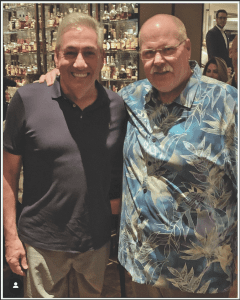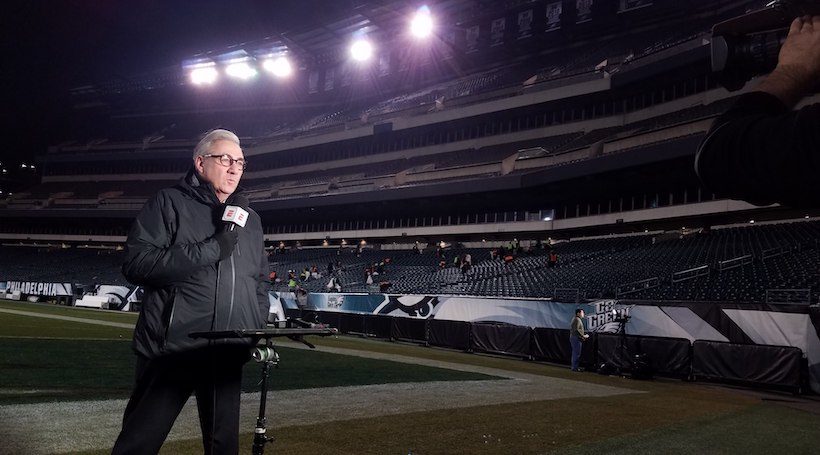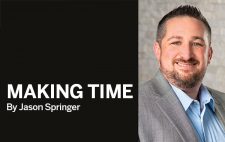With no sports in April, I was reflecting back to 25 years ago this month – hey, we’re all in a reflective mood these days, right? In early May 1995, I called my father for advice about a decision that would change my life – whether to leave a union-protected career at the Philadelphia Inquirer to accept a one-year contract from ESPN.
It was a big risk. My wife and I and our 3 daughters were living a happy, comfortable life in a modest 3-bedroom house in Haddon Township. But I also saw the big bills looming on the horizon – college tuition, weddings, you get the picture. And there was the lure of the big stage. Not everybody gets called by the worldwide leader in sports for a national TV gig.
As usual, my dad, Vito, who died eight years ago, got to the point.
“You’re nuts,” he said. “You take it. How many guys named Sal are on national TV? And if you screw it up, you can go back to your old job.”
“Anything else, dad?” I said.
“Yeah,” he said, “Don’t screw it up.”
I often told my students at St. Joseph’s University, when you cover the No. 1 sport for the No. 1 sports network in the country, you’re playing in the big leagues. If you get it wrong, they don’t let you play anymore.
So here’s what I’ve learned:
1. If your mother says she loves you, check it out.
That means exactly what it says. Check the source of your information – especially if it’s someone you trust telling you something you think you already know.
When the 2004 Philadelphia Eagles were headed to the Super Bowl, it was widely reported that wide receiver Terrell Owens, who had suffered a broken leg in the final weeks of the regular season, was going to miss the game. I was not convinced and I ignored the pressure to report an incomplete story.
Eagles Head Coach Andy Reid allowed me to report from inside the team’s facility – up to and including the night before the Big Game in Jacksonville.
When it came time to report that Owens would play in that ill-fated game, ESPN had all the details.
In Super Bowl XXXIX, Owens had nine catches for 122 yards with a dozen screws holding his broken leg together! If the Eagles had beaten the Patriots, he would have been the Super Bowl MVP.
2. The difference between the amateurs and the professionals is the professionals play hurt.
The most important ability is availability.
3. It’s not enough to aim at the target – you must hit it.
The Eagles won their first Lombardi trophy in 2018 on the wings of the greatest play in pro football history: “The Philly Special.”
The Eagles practiced that play dozens of times. But Trey Burton – passing the ball to quarterback Nick Foles – was not getting it right. Burton was too high. Too low. Sometimes wide. Then too hard.
One day, Doug Pederson just stopped practice. “Toss it like a loaf of bread,” Pederson said.
The rest is glorious football history.
4. You make the little decisions with your head, but the big decisions with your heart.
Sometimes you’ve just got to trust your gut. That’s what Pederson trusted when he called for “Philly Special” – in the Super Bowl, against Bill Belichick, the greatest coach of his generation. The Eagles had no game experience with the play. Pederson pulled the trigger in the ultimate hero-or-goat situation.

Sal Pal and Kansas City Chiefs Coach Andy Reid during Super Bowl LIV
5. Neither infidel nor believer be.
In “Moby Dick,” Herman Melville writes about the redemptive mixture of skepticism and hope. As a reporter, I try to follow this all the time.
In February I covered the Kansas City Chiefs. Like many in the Delaware Valley, I was hoping for the best story – Andy Reid finally getting his first NFL title.
But as a reporter, I had to bring a skeptic’s eye to reveal the whole story. I did a touchy interview with Reid’s son Britt, who for the first time talked about his older brother Garrett, who suffered a drug overdose in 2012.
“We all miss him,” Britt told me. “He would love this. He would have been in heaven right here.”
Andy Reid wasn’t angry about that interview. In fact, I was the only reporter allowed to stay in the team hotel in Miami. The redemptive approach of skepticism and hope.
Melville advocated that approach when America was on the brink of the Civil War. Let’s try it now – sprinkle in a little hope. Might help.
Sal Paolantonio, ESPN National Correspondent, is the longest serving NFL sideline reporter in American TV history. He lives in Moorestown.














